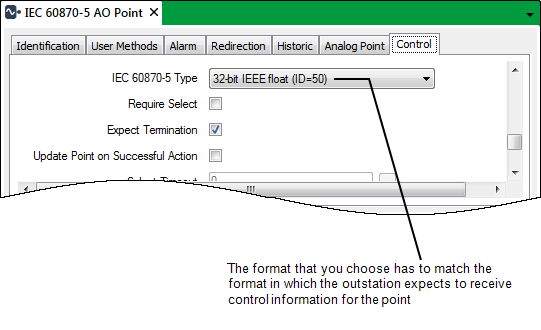This section applies to IEC 60870-5 Analog Output Points only.
The IEC 60870-5-101 protocol defines a number of ASDU formats (ID 48 to ID 51) that can be used by ClearSCADA for sending analog control information to the outstation.
The IEC 60870-5-104 protocol defines the above ASDU formats along with an additional set of ASDU formats (ID 61 to ID 64). The latter formats allow ClearSCADA to include the time with each control message that it sends to the outstation. The IEC 60870-5-104 protocol includes these additional formats as the nature of TCP/IP means that control packets may arrive at the outstation a significant amount of time after they were sent. By using one of these formats, the outstation is able to reject any control requests that are deemed too far in the past. (The exact functionality is dependent on the manufacturer’s implementation.)
Each analog output on an outstation supports one or more of the ASDU formats mentioned above (refer to the outstation’s interoperability Profile document for information on which formats are supported). When ClearSCADA transmits a control request for an IEC 60870-5 analog output point, it uses the format that is specified in the point’s configuration. For this reason, you need to configure the IEC 60870-5 analog output points in the database to use the same formats as the points they represent on the outstation. To do this, use the IEC 60870-5 Type field on the Control tab of the IEC 60870-5 Analog Output Point Form.

Use the field’s combo box to select the required control format:
- Normalized Value -1 to +1 (ID 48)—ClearSCADA takes a control value that is in the range -1 to +1 and encodes it to a 16-bit integer. It then sends that integer value in its control request to the outstation. Any control requests for values outside the -1 to +1 range are restricted to -1 or +1, as applicable.
- Scaled Value -32678 to +32767 (ID 49)—ClearSCADA takes a raw integer control value that is in the range -32678 to +32767 and encodes it as a 16-bit integer. It then sends that integer value in its control request to the outstation. Any control request for values outside the above range are restricted to -32678 or +32767, as applicable.
- 32-bit IEEE float (ID 50)—ClearSCADA encodes the control value as a signed IEEE single-precision (32-bit) floating point number. It then sends that integer value in its control request to the outstation.
Should the control value exceed the range that can be represented by a 32-bit IEEE float, ClearSCADA sends encoded value as +/- infinity.
- 32-bit Bit String (ID 51)—ClearSCADA takes the 32-bit string that is the control value and encodes it as a 32-bit unsigned integer. It then sends that integer value in its control request to the outstation.
Should the control value exceed 4294967295, ClearSCADA only sends the lower 32-bits of the value as an integer.
- Normalized Value with Timestamp (ID 61)—Only available for points on outstations that communicate using the IEC 60870-5-104 protocol. ClearSCADA encodes the control value in the same way as it does for ID 48. Additionally, it includes a time stamp in each control message.
The outstation executes the control request, unless the time stamp indicates that the request is too far in the past (in which case the request is rejected).
- Scaled Value with Timestamp (ID 62)—Only available for points on outstations that communicate using the IEC 60870-5-104 protocol. ClearSCADA encodes the control value in the same way as it does for ID 49. Additionally, it includes a time stamp in each control message.
The outstation executes the control request, unless the time stamp indicates that the request is too far in the past (in which case the request is rejected).
- 32-bit IEEE Float with Timestamp (ID 63)—Only available for points on outstations that communicate using the IEC 60870-5-104 protocol. ClearSCADA encodes the control value in the same way as it does for ID 50. Additionally, it includes a time stamp in each control message.
The outstation executes the control request, unless the time stamp indicates that the request is too far in the past (in which case the request is rejected).
- 32-bit Bit String with Timestamp (ID 64)—Only available for points on outstations that communicate using the IEC 60870-5-104 protocol. ClearSCADA encodes the control value in the same way as it does for ID 51. Additionally, it includes a time stamp in each control message.
The outstation executes the control request, unless the time stamp indicates that the request is too far in the past (in which case the request is rejected).